Media Documents
Berlin ICI (Institute for Cultural Inquiry) Lecture on Lyric Poetry and Reduction, May 16, 2022
Podcast with Kevin Hart: On the Way – Talking about God. Brisbane Australia
Istituto Cultura y Sociedad, Universidad de Navarra
CREMS (Centre for Early Modern Studies), University of York
“How to Read the Bible: Can Fundamentalists and Secularists be Brought into Dialogue,” Lake Forest Place, December 21, 2017
Video Recorded Fragments of Lecture on Humanities Tradition and the Bible at Lake Forest Place (Chicago, Illinois):
1. “Bible as Revelation in Tradition of Humanities,” Lake Forest Place 12-21-17
2. “Bible as Revelation in Secular Sense,” Lake Forest Place 12-21-17
3. “Self-Reflective Wisdom of Humanities Texts,” Lake Forest Place 12-21-17
4. “Theological Mystery of human and physical being,” Lake Forest Place 12-21-17
5. “Humanities Texts as Chanels of Theological Revelation,” Lake Forest Place 12-21-17
“Outline of an Intercultural Philosophy of Universalism,” World Congress of Philosophy, Beijing, 2018 (version without video of questions and answers)
Saarbrücken Lecture (2017): Traum-Epistemologie und religiöse Offenbarung in Dantes Vita nuova, Universität des Saarlandes
Mystical Philosophy Network, Keynote Lecture: Mysticism in Intercultural Philosophy, Glasgow University, December 2016
MTN link to videorecorded lecture
“Religious Tradition and Interdisciplinary Humanities Studies in a (Post)Secular World,” Beijing Capitol University of Business and Economics (CUEB), Beijing, October 17, 2016
Conférence sur la poésie à Opède, Lubéron, July 18, 2016
Transcendence and Immanence in Intercultural Philosophy
Video Tapes:
Opening, On Macao as Providential Place for Philosophy (William Franke) 1
Transcendence & Immanence, Macau Conference (William Franke) 2
Transcendence & Immanence, Macau Conference (Roger Ames) 3
Transcendence & Immanence, Macau Conference (Karl-Heinz Pohl) 4
Transcendence & Immanence, Macau Conference (Hans-Georg Möller) 5
Transcendence & Immanence, Macau Conference (John. W. P. Phillips) 6
Transcendence & Immanence, Macau Conference (Hans-Rudolph Kantor) 7
Transcendence & Immanence, Macau Conference (Nahum Brown) 8
Transcendence & Immanence, Macau Conference (Antonia Pont) 9
Transcendence & Immanence, Macau Conference (Fabian Heubel) 10
Transcendence & Immanence, Macau Conference (Mario Wenning) 11
Videotaped Conference: What is Apophatic Thinking and Why is it Relevant Today? Discussions around William Franke’s A Philosophy of the Unsayable
Welcoming and Introductory Remarks
Apopophatic Thinking Colloquium 1 (William Franke)
Apopophatic Thinking Colloquium 2 (Stephen Palmquist)
Apopophatic Thinking Colloquium 3 (Anthony Adler)
Apopophatic Thinking Colloquium 4 (James Wang)
Apopophatic Thinking Colloquium 5 (Sabine Müller)
Apopophatic Thinking Colloquium 6 (Sabine Müller Discussion)
Apopophatic Thinking Colloquium 9 (Andrew Hass )
Apopophatic Thinking Colloquium 10 (Hass Discussion + Nahum Brown)
Apopophatic Thinking Colloquium 11 (Discussion + Nahum Brown)
Apopophatic Thinking Colloquium 12 (David Chai)
Apopophatic Thinking Colloquium 13 (Karl-Heinz Pohl)
Apopophatic Thinking Colloquium 14 (Closing Discussion)
Apophatic Thinking Colloquium 15 (Closing Reflections – William Franke)
Videotaped Lecture : “Rethinking Cultural Universality Today and The Question of Theological Transcendence”
Rethinking Cultural Universality Today and The Question of Theological Transcendence
(Video Taped Lecture, Sri Lanka, March 2, 2014)
Rethinking Cultural Universality Today and The Question of Theological Transcendence
Videotaped Lecture: 23rd World Congress of Philosophy: “Philosophy as Inquiry and as Way of Life” School of Philosophy, University of Athens, Greece, August 2-11, 2013
“Thinking in the Gap between the Cultures of Greece and China: Apophatic Universalism”
(Single Videotaped Lecture)
“Authorial Intentions” Book Interviews (Conversations with Chris Benda about recent books by William Franke)
Dante and the Sense of Transgression
The Revelation of Imagination: From the Bible and Homer through Virgil and Augustine to Dante
Authorial Intentions: Interviews with Chris Benda on: Secular Scriptures; A Philosophy of the Unsayable; Dante and the Sense of Transgression; The Revelation of Imagination
Secular Scriptures: Modern Theological Poetics in the Wake of Dante
Syndicate Theology Symposium [https://syndicatetheology.com/symposium/a-philosophy-of-the-unsayable/]
A Philosophy of the Unsayable

Symposium Introduction
by Kendall Cox
In A Philosophy of the Unsayable, William Franke examines the “valences and varieties” of what cannot be said—from the indeterminacy of language to the infinite openness of thought to the ineffability of the divine and the unspeakability of suffering. The work reflects Franke’s depth of study across the fields of philosophy, theology, and literature as a professor of Comparative Literature and Religious Studies at Vanderbilt University and of Philosophy and Religions at the University of Macao. Here he condenses and clarifies some of the main themes and assertions of his two edited volumes On What Cannot Be Said: Apophatic Discourses in Philosophy, Religion, Literature and the Arts (2007). Both projects draw attention to “apophasis” as a distinct genre that spans a host of related disciplines. Franke’s concern is to identify and set in conversation certain resources in the Western intellectual tradition that figure as “a kind of perennial counter-philosophy to the philosophy of Logos” (1). “Apophasis” specifically designates, for him, the “negation”—namely the “self-negation”—of discourse (80). Franke discerns within discourses as manifold and varied as Neoplatonism, negative theology, medieval mysticism, Romantic poetry, Death of God theology, Radical Orthodoxy, and especially contemporary continental philosophy “major monuments” of what he calls an “apophatic culture” (2). He concludes the work with the claim that “apophaticism is the soul of philosophy inasmuch as it critically questions everything that can be believed” (328).
 In the first few chapters of A Philosophy of the Unsayble, Franke examines the theme of unsaybility in literature. Peppered with epigraphs and insights from literary figures such as Shakespeare, Rilke, Hölderlin, Dickenson, Beckett and many others, in these initial theoretical and literary-critical reflections, Franke turns to Hegel and post-Hegelian philosophy (chapters 1-2) as well as the “pathbreaking” post-holocust poetry of Paul Celan and Edmond Jabès (chapter 3) (83). In the second half of the book, Franke more explicitly examines the relationship between philosophy and theology, enacting the “trans-philosophical thinking” he commends (5). One of his goals is “to situate apophatic thought as key to some of the most challenging developments and disputes in the philosophy of religion today” and “to mediate and unblock the deadlock between secularizing…and theologizing approaches” (274). He attempts to bridge discourses as apparently polarized as the “postsecular religious revivalist philosophy” (or Radical Orthodoxy) of figures such as John Milbank, Catherine Pickstock, and Graham Ward, on the one hand, and the secular or atheistic philosophy of Thomas Altizer, Slavoj Žižek, Alain Badiou, Giorgio Agamben, and John Caputo, on the other (chapters 4-7). Franke says these discourses have a “common basis in critical, apophatic insight” (270). Apophasis is “the missing link.
In the first few chapters of A Philosophy of the Unsayble, Franke examines the theme of unsaybility in literature. Peppered with epigraphs and insights from literary figures such as Shakespeare, Rilke, Hölderlin, Dickenson, Beckett and many others, in these initial theoretical and literary-critical reflections, Franke turns to Hegel and post-Hegelian philosophy (chapters 1-2) as well as the “pathbreaking” post-holocust poetry of Paul Celan and Edmond Jabès (chapter 3) (83). In the second half of the book, Franke more explicitly examines the relationship between philosophy and theology, enacting the “trans-philosophical thinking” he commends (5). One of his goals is “to situate apophatic thought as key to some of the most challenging developments and disputes in the philosophy of religion today” and “to mediate and unblock the deadlock between secularizing…and theologizing approaches” (274). He attempts to bridge discourses as apparently polarized as the “postsecular religious revivalist philosophy” (or Radical Orthodoxy) of figures such as John Milbank, Catherine Pickstock, and Graham Ward, on the one hand, and the secular or atheistic philosophy of Thomas Altizer, Slavoj Žižek, Alain Badiou, Giorgio Agamben, and John Caputo, on the other (chapters 4-7). Franke says these discourses have a “common basis in critical, apophatic insight” (270). Apophasis is “the missing link.
The way Franke relates philosophy, theology, and literature is a common thread in the responses comprising this symposium on his work. Franke believes that in the face of “what cannot be said,” 1) philosophy “necessarily becomes literary” and 2) language is pushed “in a direction which is best understood as theological” (4).
Sai Bhatawadekar highlights the performative quality of a “philosophy of the unsayable,” integrating humor, hymnody, as well as some of her own aphoristic rhymes into her response. Bringing together modern German philosophy and South Asian Studies, Bhatawadekar’s engagement with Franke is set against the backdrop of her upbringing in a Hindu household where, she says, the “bizarre appearances” of various gods and goddesses represented “very imaginative yet ultimately feeble attempts of depicting something beyond human capacities.”
Kevin Hart, himself a theologian, philosopher, and poet, is well aware of the sorts of resonances Franke identifies across these distinct discourses. However, he is wary of collapsing the differences between the contemplative practices of medieval mysticism and, for example, the brokenness of language that marks post-Holocaust German literature. Hart suggests teasing out more thoroughly the various “modes” in which unsayability “impinges on us.” He also notes the fact that apophasis “is ineluctably tied to” kataphasis—a point Aaron Simmons makes as well. Writing from the perspective of modern philosophy of religion, Simmons raises a number of other important questions, including whether the “ground between philosophy, literature, and religion” might “be made a bit less slippery” and whether the discussion would benefit from a broader engagement with analytic philosophy and epistemology.
In light of the poetic and theological quality of Franke’s writing, Stephen Palmquist specifically considers the question of whether it is “properly named philosophy.” He believes Franke’s claims about apophatic language could be grounded more clearly in an apophatic logic that can make “sense out of language that might otherwise appear to be but a literary game.” William C. Hackett too draws attention to the problem of language and identity. His response to Franke takes the form of an extended reflection on Aristotle’s understanding of metaphor in light of Franke’s criticism that metaphysics has been “interpreted narrowly as a deductive system and without regard for its allusive and largely poetical power of vision” (39). Hackett, like Franke and some of the other panelists, notes the close affinity between the kind of apophatic questioning Franke describes and religious commitment. But Hackett wonders whether Franke’s valorizing of “leaving the question of religion undecided” (269) is itself “an a priori decision constricting the possibility of divine revelation” such that “the a priori character of (absolute) indecision” becomes a nihilistic “affirmation of the impossibility of a last word.”
In all, one of the most valuable dimensions of the book that surfaces in this symposium is the profound connection between thought and life within Franke’s “philosophy of the unsayable.” It embodies the fact that, in Simmons’ words, at its best “philosophy is itself lived engagement.”
Panelists
Christopher Hackett
Stephen R. Palmquist
J. Aaron Simmons
Kevin Hart
Sai Bhatawadekar
About the Author
William Franke is professor of philosophy and religions at the University of Macao and professor of comparative literature and religious studies at Vanderbilt University.
A Philosophy of the Unsayable

Symposium Introduction
by Kendall Cox
In A Philosophy of the Unsayable, William Franke examines the “valences and varieties” of what cannot be said—from the indeterminacy of language to the infinite openness of thought to the ineffability of the divine and the unspeakability of suffering. The work reflects Franke’s depth of study across the fields of philosophy, theology, and literature as a professor of Comparative Literature and Religious Studies at Vanderbilt University and of Philosophy and Religions at the University of Macao. Here he condenses and clarifies some of the main themes and assertions of his two edited volumes On What Cannot Be Said: Apophatic Discourses in Philosophy, Religion, Literature and the Arts (2007). Both projects draw attention to “apophasis” as a distinct genre that spans a host of related disciplines. Franke’s concern is to identify and set in conversation certain resources in the Western intellectual tradition that figure as “a kind of perennial counter-philosophy to the philosophy of Logos” (1). “Apophasis” specifically designates, for him, the “negation”—namely the “self-negation”—of discourse (80). Franke discerns within discourses as manifold and varied as Neoplatonism, negative theology, medieval mysticism, Romantic poetry, Death of God theology, Radical Orthodoxy, and especially contemporary continental philosophy “major monuments” of what he calls an “apophatic culture” (2). He concludes the work with the claim that “apophaticism is the soul of philosophy inasmuch as it critically questions everything that can be believed” (328).
In the first few chapters of A Philosophy of the Unsayble, Franke examines the theme of unsayability in literature. Peppered with epigraphs and insights from literary figures such as Shakespeare, Rilke, Hölderlin, Dickenson, Beckett and many others, in these initial theoretical and literary-critical reflections, Franke turns to Hegel and post-Hegelian philosophy (chapters 1-2) as well as the “pathbreaking” post-holocust poetry of Paul Celan and Edmond Jabès (chapter 3) (83). In the second half of the book, Franke more explicitly examines the relationship between philosophy and theology, enacting the “trans-philosophical thinking” he commends (5). One of his goals is “to situate apophatic thought as key to some of the most challenging developments and disputes in the philosophy of religion today” and “to mediate and unblock the deadlock between secularizing…and theologizing approaches” (274). He attempts to bridge discourses as apparently polarized as the “postsecular religious revivalist philosophy” (or Radical Orthodoxy) of figures such as John Milbank, Catherine Pickstock, and Graham Ward, on the one hand, and the secular or atheistic philosophy of Thomas Altizer, Slavoj Žižek, Alain Badiou, Giorgio Agamben, and John Caputo, on the other (chapters 4-7). Franke says these discourses have a “common basis in critical, apophatic insight” (270). Apophasis is “the missing link.
The way Franke relates philosophy, theology, and literature is a common thread in the responses comprising this symposium on his work. Franke believes that in the face of “what cannot be said,” 1) philosophy “necessarily becomes literary” and 2) language is pushed “in a direction which is best understood as theological” (4).
Sai Bhatawadekar highlights the performative quality of a “philosophy of the unsayable,” integrating humor, hymnody, as well as some of her own aphoristic rhymes into her response. Bringing together modern German philosophy and South Asian Studies, Bhatawadekar’s engagement with Franke is set against the backdrop of her upbringing in a Hindu household where, she says, the “bizarre appearances” of various gods and goddesses represented “very imaginative yet ultimately feeble attempts of depicting something beyond human capacities.”
Kevin Hart, himself a theologian, philosopher, and poet, is well aware of the sorts of resonances Franke identifies across these distinct discourses. However, he is wary of collapsing the differences between the contemplative practices of medieval mysticism and, for example, the brokenness of language that marks post-Holocaust German literature. Hart suggests teasing out more thoroughly the various “modes” in which unsayability “impinges on us.” He also notes the fact that apophasis “is ineluctably tied to” kataphasis—a point Aaron Simmons makes as well. Writing from the perspective of modern philosophy of religion, Simmons raises a number of other important questions, including whether the “ground between philosophy, literature, and religion” might “be made a bit less slippery” and whether the discussion would benefit from a broader engagement with analytic philosophy and epistemology.
In light of the poetic and theological quality of Franke’s writing, Stephen Palmquist specifically considers the question of whether it is “properly named philosophy.” He believes Franke’s claims about apophatic language could be grounded more clearly in an apophatic logic that can make “sense out of language that might otherwise appear to be but a literary game.” William C. Hackett too draws attention to the problem of language and identity. His response to Franke takes the form of an extended reflection on Aristotle’s understanding of metaphor in light of Franke’s criticism that metaphysics has been “interpreted narrowly as a deductive system and without regard for its allusive and largely poetical power of vision” (39). Hackett, like Franke and some of the other panelists, notes the close affinity between the kind of apophatic questioning Franke describes and religious commitment. But Hackett wonders whether Franke’s valorizing of “leaving the question of religion undecided” (269) is itself “an a priori decision constricting the possibility of divine revelation” such that “the a priori character of (absolute) indecision” becomes a nihilistic “affirmation of the impossibility of a last word.”
In all, one of the most valuable dimensions of the book that surfaces in this symposium is the profound connection between thought and life within Franke’s “philosophy of the unsayable.” It embodies the fact that, in Simmons’ words, at its best “philosophy is itself lived engagement.”
Panelists
Christopher Hackett
Stephen R. Palmquist
J. Aaron Simmons
Kevin Hart
Sai Bhatawadekar
About the Author
William Franke is professor of philosophy and religions at the University of Macao and professor of comparative literature and religious studies at Vanderbilt University.
COMMENTARIES
SYMPOSIUM EDITOR
Join Syndicate’s Mail List
A Personal Reaching Out

Commentary on A Philosophy of the Unsayable
by Sai Bhatawadekar on March 27, 2016
Opening Performance
Franke walked into a bar, said to the bartender: hit me with an Absolut Spirit, pour in the Negativa Modelo, and reconcile the two, shaken and stirred. Oh, and don’t forget to salt and sublime it. The bartender fell . . . . . . . . . silent.
They told me not to open with a joke! I can’t expect the joke to be as amusing to you as it is to me, but hopefully it illustrates Franke’s book for its many aspects: the Hegelian pivot of the Absolut(e) Spirit, the Via Negativa model, and reconciliation of the two opposites, spiced up with the citrical-critical wordplays, puns, and ellipses.
I read Franke’s book cover to cover, each word, aloud, twice, if not three times; I read it to myself in solitude, occasionally someone read it out to me; I stopped, explained, and discussed at important junctures what it meant and what it meant to me. This experience of Franke’s book ended up being much like how scriptures, epics, chants, or hymns are written, read, recited, and remembered. I read it with as much abundance, excess, repetition, and outpouring as Franke put into it, and I sincerely mean that as a compliment. A philosophy of the “unsayable” was either going to be a very thin book or quite a profuse one, much like the “unsayable” itself, the quest and performance of which is either in silence or in the poetics of plenitude, where what you say is both only allegorical and yet never enough. That is the apophatic “dimension” in thought and language, as Franke explains (296–97). Franke delivers what he promises at the beginning: “A certain dimension of literary performance is as crucial for this act of ventriloquism (of lending voice to the unspeakable) as are its conceptual contents” (5). The book pulls a remarkable variety of thematic threads and thinkers together—rational and literary, secular and theological—“reaching out toward the intention of apophatic discourse” while remaining “something of the order of personal witness” (6).
So let me assume the same stance in this review—a personal reaching out. Let me sketch my hermeneutic horizon for you at the outset, to give you an idea of the window through which I read this book: I grew up in a Hindu household; we viewed several gods and goddesses from the point of view of mythology and epic stories; their bizarre appearances—ten arms, elephant head, blue skin, etc.—were already indicative of very imaginative yet ultimately feeble attempts of depicting something beyond human capacities. Chanting untranslated, unexplained Sanskrit hymns at school and home was more of a matter of memory exercise than of religious indoctrination; we chanted multiplication tables in the same breath right afterward. Looking back I realize, negation was an essential part of our intellectual and critical training—from household arguments to decision-making to scientific methods—to test if our statements stood up to all questioning and contrary evidence. It was through German studies that I chanced upon comparative philosophy, and it was through Hegel and Schopenhauer’s interpretations of Hindu and Buddhist philosophies that I came back to investigate my own heritage in cross-cultural context. I am a Hindu, Advaita Vedantin, secularist, atheist, Hegelian, Schopenhauerian, Romantic, existentialist, nihilist, artist, intellectual, and much more all at once; these cross-cultural currents that I carry in my hermeneutic horizon ebb and flow within me in manic-depressive waves. On many levels, then, A Philosophy of the Unsayable resonates with me. In the following review I will present the themes that emerge for me in Franke’s book, rather than giving a chapter-by-chapter analysis. It is also a conscious writing-style choice on my part to mix in my spontaneous reactions and humorous takes together with an analytical inquiry into this book. The very subject matter of this book, Franke’s own persistent and impassioned bearing, and his urge to overcome the rational in favor of experiencing immediacy demand of me that I don’t simply deliver a strict analytical review, but bring in my unpremeditated and creative responses. Much like his, mine is also a “performance” piece “of the order of personal witness” (6).
Language and the Hegelian Pivot
A Philosophy of the Unsayable rocks me rhythmically between two extremes: the power of language and the powerlessness of language. It takes me back to my days of qualifying exams when I did language philosophy of two non-consecutive German literary periods—Romanticism and Turn of the Century: the oscillation between Romantic celebration of language to bring us to the brink of the sayable, and the utter despair of Fin de Siècle with the complete uselessness of language as a tool for meaning and communication. On the Romantic side, one celebrates the incredible creative power of language to evoke the elusive to appear, to become the vehicle for the imagination, to blur boundaries between worlds, being fully aware that language may not embody the unsayable, but it can point to it. The power of language lies in creating “a relation that is not conceptual so much as affective and projective” (255). On the Turn of the Century side of the same coin, one is struck with Sprachkrise, with the “signifier forever severed from its signified” (81). It unleashes agony and anxiety, mistrust, the dark lament and hopelessness that no matter how much one tries, one cannot express and communicate anything fully, not just God or the Other, but anything at all. Franke takes us further into post Holocaust poetry, where language breaks down violently in the face of an unspeakable singular event. Words, as wounds and dismembered corpses, must “enact annihilation” (117, 120); their tangible texture and taste must open up an intangible void (99, 104). As Franke says, “language is exposed in its inability to express, and this is its greatest, perhaps its only genuine, expressive power” (135). On both sides—the ineffability beyond language and in the midst of language (133), the creative euphoria and the destructive despair—language has the ability to bring itself to its own precipice; language and its poetic pursuit of the unsayable is an eternally ecstatic and masochistically longing and depriving foreplay that would never come to culmination, unless one was willing to leap and let go.
Hegel is indeed, as Franke says, “the historical anchor and pivot” in this oscillation (45). Hegel, with his progressively self-knowing fully articulated rational Spirit, reacted against the Romantic quest for the mysterious mystical ineffable beyond. And those who followed Hegel disintegrated language and structure and opened up to the unknowable to protest against Hegel’s certainty and closure of absolute knowing. Not surprising, that this intellectual back and forth should happen in an Hegelian style, as a negation of an established line of thought; as Franke says, we “need an opponent in order to gain traction” (294): Romantic thinkers wanted to go back to the origins of civilizations, religions, and cultures; Hegel spoke of origins only in terms of having overcome them in the line of progress. Romanticism sought an intuitive, immediate, intimate connection with the divine absolute; Hegel condemned such subjective intuition as it “cannot achieve objective expression and so can achieve no substantial, historical reality, either” (45). Romantic writers sought access to hidden secrets of the world, to cryptic, enigmatic, obscured layers and circles of experience; Hegel laid it all bare, parsed and analyzed, in this one plane of reality and linear direction of history. Romanticism found rationality limiting and finite; Hegel presented Reason itself as and in its infinity and absoluteness.
And now in turn, true to the spirit of negation, Franke’s book tackles Hegel to unlock him (not to undo or contradict him, Franke would say, but to surpass him, as he considers Hegel “indispensable . . . within the movement of thought that forges irrepressibly ahead” [202]): Hegel painstakingly separates religion from philosophy; the “philosophy of the unsayable” fuses them back together, declares that philosophy and theology require each other. Hegel explains that the spirit moves up from religion to philosophy—to a higher state of reflection; Franke at times reverses that direction and concludes that “philosophy, thought radically, does turn ineluctably into religion of sorts,” that the self-critical enterprise that philosophy is, has to turn to religion at its critical precipice, but ultimately even beyond religion; philosophy necessarily develops to “self-crippling reflection that makes a virtue of self-deconstruction” (199–201). Hegel vehemently criticizes both Eastern and Western strands of mysticism and states that a universal concept, about which nothing can be said, is all too abstract, passive, simple, and devoid of content. Franke plays with the poetics of language, with saying and unsaying, to ultimately open up to, what Armstrong calls, an “unspeakably rich and vivifying” infinity (299). Hegel thinks the un-knowing of that abstractness demotes human thinking down from being the vehicle of divine self-determinacy; Franke states that the unknowing openness to infinity is a more self-critical and self-aware state of human thinking. From Hegel to Franke, we go from rational to beyond-rational, reasoning to poetics, mind to body, language to apophasis, linear understanding to an opening up in all directions. We go from Hegel’s thought and language that can fully articulate the spirit to wondering if thought and language are only witnesses, pointing to but not fully expressing the ultimate. Hegel’s negation is his crucial dialectic step needed to enable the movement of a concept through its linear progression. We employ negation as an operation to stop any further movement of thought which hopes to arrive at full knowledge; negation as an operation to shatter our habit of categorical, logical, and consistent thinking; negation that makes room for inconsistencies, contradictions, paradoxes, and finally silence. Negation not of some-thing into its opposing thing, both of which are things, but negation as a function that opens to the mystery of no-thing (62). From Hegel’s negation that is wielded to ensure a fully articulated discourse, we go to a negation for what cannot be said, to show the futility of wanting to ensure a fully articulated discourse. We go from the tight closure of Hegel’s system of the self-revealing fully known Absolute, in which all questions are answered to a questioning “openness” that requires “unknowing” and “unsaying.”
From Opposition to Openness
The first instance in this book of this “openness” brought tears to my eyes, and I promise it was not because I was reading while in a massage chair getting a pedicure
.
It is not the concept of God as “that than which none greater can be thought” . . . but rather the openness of thought to the infinity that is realized in actually thinking this . . . There is here no logical deduction of God’s existence from a necessary concept but, simply, the realization of infinite openness of mind, which is itself the very being of God conceived of as infinite Intellect (29).
To begin with, my immediate teary moment was a demonstration of the juxtaposition and the power of the sayable to push you/me to the experience of the unsayable. Secondly, it is an excellent example of taking a very Hegelian idea of “God conceived of as infinite Intellect” and unlocking it toward infinite openness. This sentence of page 29 is also a very important early checkpoint: the statement cautions against the common tendency that apophasis or the unsayable concerns an entity (God) that is beyond and outside of us and our capabilities. It is not simply a transcendent divine entity or the totality of nature or cosmic oneness, or any such all-encompassing idea, vis-à-vis which we stand ignorant and humbled; all of the above is nothing but our mental and emotional openness to infinity itself, by which token we are also contemplative and empowered. The unsayable is as much within us, as it is the ultimate Other.
Speaking of the unsayable within us, it is noteworthy of Franke to bring up Freud, however briefly; that aspect has tremendous potential to be explored elsewhere at some point. The unsayable within us is not just the post-rational infinity but also the pre-rational instinct. It is both what reveals itself after we have exhausted all categories and concepts and also what always was before we learned to categorize in the first place. It is both divine bliss and primal insanity. In that sense it is truly awe inspiring: “Still this indeterminate ‘it’ may actually be, as Benjamin and Blanchot in different ways suggest, more immediate than any immediacy that is caught between the poles of presence and absence, more present than any presence, although the unmediated experience of it could only be madness, or perhaps the bliss of beatitude” (153). The madness, along with the beatitude, that is to say, both (un)ends of the spectrum of the unspeakable, are worth examining equally. Speaking of Freud, the madness of the Trieb that nightmares are made of, the Trieb which is moderated and mediated in everyday life, the immediacy that we fear to experience ourselves and are unable to communicate with loved ones, that is also the dark infinite unspeakable abyss, just as the luminous blissful infinity. Primal rawness and ultimate finesse both belong to apophasis.
But ultimately, Franke moves us beyond all dichotomies; that is the best lesson of this book and the most productive push of negation toward openness (or the most frustratingly disarming one, if you are in Monty Python’s Argument Clinic). While using negation, it is all too easy to fall into the play of opposites, finite-infinite, transcendent-immanent, presence-absence, language-silence, absolute being-absolute nothingness, radical orthodoxy-secularism/atheism. The opposition of kataphatic and apophatic approaches is obvious, but even within apophasis, there seem to be the apophasis of fullness and the apophasis of emptiness, bliss and despair, spiritual speechlessness and philosophical and logical dead-end silence, because “anything you say can be used against you.” Apophaticism is either accused of being nihilist or a sneaky way to get religion into secular thought (327). Franke’s negation shows that arguing for or against either extreme is idolatrous (318). Negation is a preventative measure, a self-critical tool to keep yourself from idolizing philosophical concepts, from getting caught in the wordplay. Negation is not a stop; it is an opening to infinity. Negation is not a paralyzing hold; it is a release for you and everything else simply to be or not to be, or both, or neither, and all of the above, and none of the above, and so on . . . To me it feels like these logically dichotomous concepts are not on the opposite ends of a linear equation; rather it is as if they are in a dynamic dance on the loop of the infinity symbol itself— ∞ —rising and diving in each other in rhythmic momentum.
Knowledge and Kenotic Receiving
Reading Franke reinforces and expands the discussions I have had with my colleagues on our group project on apophasis and world religions. We have been meticulously defining and separating various terms regarding “knowledge” in and outside of the religious context: awareness, apprehension, grasp, understanding, cognition, comprehension, etc. These terms necessitate a certain subject-object relationship; the subject—I—has agency and puts active effort in seeking, gaining, containing, and possessing the knowledge of the object—God (or the divine, or Being, or an array of such concepts)—by linguistic, rational, or other manageable means. That is the literal meaning of the German word—Be-griff (concept): greifen is to reach for, grasp, and hold. Moving from knowledge to imagination already loosens that grip and lends the process of engaging with the divine a certain creativity and play. Moving to a more receptive term, such as experience of the divine, takes us one step further to the “kenotic self-emptying” that Franke advocates (165, 170). Instead of possessing knowledge on our terms, it is a process to let go, so it happens and “occurs” to us. Franke’s apophatic negation is a method for kenotic “self-suspension and “self-subversion” (242), surrendering and yielding of agency or an acknowledgment of lack of control, to let the divine come to us, reveal itself. Franke offers a new set of terms to allow for the interplay between agency and surrender:
This is, then, a poetic type of “knowing,” or rather not a knowing at all in the strict, scientific sense, but rather a “making” and performing—or a participating and a receiving—in which true knowing consists in becoming one with the known. It is also an “imitating,” where the resemblance to what is imitated remains pure conjectural or “constructivist.” Only by projecting ourselves into the world as open infinitely and as somehow beholden to an Infinite do we avoid delimiting experience and eclipsing its truth by confining it to the measure of some criterion of our own fabrication. (212)
This kind of knowing, this “spiritual movement of opening . . . is a kind of existential act, not a cognitive content” (268). Indeed!
On a side note, considering how the analysis of language structures is important to Franke in the context of apophasis, it is not misplaced to bring up that this receptive knowing reminds me of some “indirect” structures in Hindi and Marathi. In these languages certain constructions are used both in direct and indirect structures, e.g., “I am happy/sad” but also “happiness/sadness happened to me,” or (funnily enough) “a daughter happened to her” (she gave birth to a daughter). These sentence structures imply that certain occurrences “happen to us” by an alignment of circumstances not all of which are under our control. What is interesting is that these indirect constructions are not limited to emotional or bodily occurrences, as in the above examples, which are declaredly out of rational reach; even mental operations and actual actions sometimes fall under this structure in everyday speech: e.g., one can say both, “I understand” and “it comes/arrives into my understanding,” “I know” but also “it is known to me,” “I remember” but more frequently “to me it is memoried” or “to me it is coming memoried.” “I have to go,” that is to say, I feel internally and externally compelled to go, is expressed as “(it) is to me to go.” Even learned skills and know-hows—cooking, swimming, playing music, etc.—“come to you”: “I can play the violin” is precisely expressed as “(the skill of) playing violin comes to me,” as if in diligent worship and “adoration” (177) and as a grateful receiver you let the gift of the skill grace you.
I come from a culture that is both hailed and criticized for this attitude of “letting things happen to you,” of “going with the flow,” as it were. Studying German philosophy and making a career in the United States has compelled me to unlearn or at least question some of that attitude: here there is a tremendous emphasis on having and exercising one’s agency and control over one’s thoughts, actions, interactions; there’s emphasis on knowing and asserting who one is and how one operates. Self worth and success depend on it, and in turn, fault, guilt, and self-critique (if not loathing) are attached to not possessing that agency and knowledge. Reading Franke on the one hand reassures me that my philosophy and practice is a sound one—that of letting it (whatever it may be) organically reveal and evolve. On the other hand, if one were to implement this philosophy seriously in vision and behavior (and I don’t think philosophies should or can remain only on the level of cerebral musings), then it would have stressful consequences that are not aligned with how we expect ourselves to live here. Maybe that’s the price of change! It is obvious that the philosophy of apophasis has commonalities with other religions and philosophies worldwide, as Franke mentions (320). Having been tossed around in waves of colonial, postcolonial, decolonial, transnational, and global dynamics, it will be interesting to see how apophasis reveals itself in cross-cultural comparative approaches. Five of us—Aaron Simmons, Michael Shuster, Amer Latif, William Edelglass, and I—are exploring apophasis in Christianity, Judaism, Islam, Buddhism, and Hinduism, respectively, in our new book project; we are examining its avatars from within each tradition and also its cross-religious and modern implications.
In this project, among other aspects, I will be working on the Hymn of Creation from the Ṛgveda. It bears to be quoted here as a complementing example to the Neoplatonic “Hymn to the Transcendence of God” that Franke presents. The Ṛgvedic Hymn is a profound illustration of apophasis: giving open room for poetics to imagine being and creation not as “as” but as “as if,” as Franke explains Plotinus (298), creatively “effecting of presence, a tracing or arrival of transcendence within immanence” (268), while throughout and ultimately playing with the poetics of negation, questioning, and “learned ignorance” (310):
The Hymn of Creation
There was neither non-existence nor existence then.
There was neither the realm of space nor the sky which is beyond.
What stirred?
Where?
In whose protection?
Was there water, bottlemlessly deep?
There was neither death nor immortality then.
There was no distinguishing sign of night nor of day.
That One breathed, windless, by its own impulse.
Other than that there was nothing beyond.
Darkness was hidden by darkness in the beginning,
with no distinguishing sign, all this was water.
The life force that was covered with emptiness,
that One arose through the power of heat.
Desire came upon that One in the beginning,
that was the first seed of mind.
Poets seeking in their heart with wisdom
found the bond of existence and non-existence.
Their cord was extended across.
Was there below?
Was there above?
There were seed-placers, there were powers.
There was impulse beneath, there was giving forth above.
Who really knows?
Who will here proclaim it?
Whence was it produced?
Whence is this creation?
The gods came afterwards, with the creation of this universe.
Who then knows whence it has arisen?
Whence this creation has arisen
– perhaps it formed itself, or perhaps it did not –
the One who looks down on it,
in the highest heaven, only He knows
or perhaps He does not know.
Translation by Wendy Doniger O’Flaherty
http://www.shraddhananda.com/The_Poetry_of_Creation_Rig_Veda_Book_10_Hymn_129.html
Aphorisms of Apophasis, Hymn of Inconclusion
In ancient Indian texts, as in Plato, Proclus, and gang, philosophical discourse was “hymnic in nature,” praising the divine, “assimilating oneself to divinity,” and yet also experimenting, doubting, and questioning (259). It is only in self-critical humor that I undeservedly call my following (a)musings aphorisms or hymns; I have no poetic genius, and these are but stumbling rhymes, but the questioning is genuine and sincere, and so is the unknowing, in line with the poetics of apophasis:
Is negation the most profound key
to all locks apriori
or is it the oldest trick you see
in the books to beat your foe?
I don’t know; I can’t tell; will I ever unknow?
Yes, negative theology
can indeed be
negated endlessly,
but can we foresee
idolizing “open infinity”
just as badly
as “to be” or “not to be”
or any other concept, high or low?
I don’t know; I can’t tell; will I ever unknow?
Is apophasis the apogee
of a “non-aggressive” quality (294)
that could end religious polemy
or will we perennially disagree
whose apophasis is deep and whose hollow?
I don’t know; I can’t tell; will I ever unknow?
What does it all mean to me
as I sit here in Hawaii
by the vast indifferent sea
Should I stop asking? Can I let go?
Yes yes yes, no no no.
I don’t know; I can’t tell; will I ever unknow?
 Sai Bhatawadekar is Assistant Professor in Indo-Pacific Languages and Literatures at the University of Hawaii at Manoa.
Sai Bhatawadekar is Assistant Professor in Indo-Pacific Languages and Literatures at the University of Hawaii at Manoa.
Words and Wonder: Reply to Sai Bhatawadekar
by William Franke on March 27, 2016
Introduction
I cannot express enough—and this does call to be said—how grateful I am to all of the panelists and to Christian Amondson and the Syndicate Forum for this opportunity to receive and respond to these insightful and probing reactions to this book. The group of essays sets side by side an intriguingly varied range of responses. It honors and celebrates the work, as well as leveling telling critiques and raising provocative questions for further consideration and debate. The responses show how open this topic of the unsayable is to all different sorts of approaches and how unpredictable, how unsettled and unsettling, it remains. Like Saint Paul, it can become all things to all people and helps reveal us to one another through comparison on this elusively common concern.
These are very substantive responses expressing sharp divergences and serious challenges, as well as heart-felt resonance and deep understanding and community of views. Although the responses are all quite different, the principal common thread I perceive running through them is the question of what “philosophy” is and of whether and in what sense A Philosophy of the Unsayable is indeed a philosophy. At stake here are larger questions of how philosophy, in the perspective of the unsayable, positions itself with regard to theology and literature, as well as with respect to truth and knowledge generally.
I can say right away that I employ the word “philosophy” not to say what the book definitively is but simply to begin from somewhere in order to explore the ways in which what I say needs also to be unsaid. This issue will come up and be treated from specific angulations in the detailed responses to each essay and especially in the “conclusion” following the whole set of answers to each panelist, but of general relevance in all of these instances is the fact that the title on the cover of the book was intended by the author to be crossed out entirely. This was finally not allowed by the publisher. It would have fundamentally changed the perception of what is entailed in entitling the work “A Philosophy . . . .”
* * *
Sai Bhatawadekar’s comments on the book bear most significantly on how it is to be read. Bhatawadekar exemplifies how to respond in a personally engaged, joyous, and even quite humorous style that gives much more (at least in some regards) than mere analytical observations could. Her response is itself poetic, communicating rhythms that “rock” reading. I was not able previously to imagine the ideal reader that I would like to have for this book, but now see her! This is the type of communication of meaning through books that makes the whole wearying process of publishing and the sometimes alienating academic system seem worthwhile and even a godsend. I feel the same sort of spontaneous emotional response reading her that her response to the book conveys and expresses in her own beautiful, poetically charged language.
Bhatawadekar’s text is thus much more than a commentary on or review of A Philosophy of the Unsayable. It is a primary text in its own right, a direct witness to unique personal experience, and an original enactment of the type of philosophical vision that the book articulates. She applies apophatic thinking in poetic inventions of her own and fashions it into a unique, real-life, existential appropriation. She reflects it through her own Hindu world and language. And she could do nothing better, since the virtues of this philosophy are demonstrated most powerfully not by disputation seeking to deploy coercive arguments but by the fertility of this vein of response issuing in further elaborations and creations.
The markedly personal nature of this commentary (answering to the book’s already personal method of philosophizing) elicits from me also a more personal type of reaction. The more critical and fractious questions concerning philosophy will be dealt with in the other responses. But writing is not only for the sake of critique or conceptual analysis: it is also for life and celebration and hallelujah, wherever and whenever writing is able to rise to this higher calling! It is a great success for apophasis that it can inspire and enable such existentially life-transforming encounters in and through texts.
One would not normally look for such original and such powerfully poetic and moving and spirited writing in the genre of the book review or of the philosophical commentary, but here is this beautiful gem of philosophical-spiritual literature produced within the space of an internet response forum. Chapeau!
My own main response to Bhatawadekar cannot but be a feeling of gratitude and of gratification—and even more, of astonished admiration for such a beautiful piece of writing in response to my own discursions. The capacity of philosophy to edify and inspire beyond its functions of criticizing and instructing is vindicated here in an unexpectedly fresh and thoughtful and authentic way.
The extensions and applications of apophatic reflection in the direction of the Ṛg Veda’s “Hymn of Creation” and of other ancient Indian texts is one that I have long wanted to pursue. Bhatawadekar’s citations and allusions point the way down one of the paths along which I knew I must take my apophatic philosophy. My now forthcoming book Apophatic Paths from Europe to China: Regions without Borders pursues a cross-cultural comparison of Western apophatic traditions with ancient Chinese wisdom, particularly with classical Daoist and Confucian philosophy, but the encounter with the Hindu sources remains, for me, still to be explored. I receive here some precious indications marking out the path.
Bhatawadekar offers her “(a)musings” also in the form of an original poem of her own. The poem epitomizes how the reaction incited by the thinking of apophasis may be a poetic performance perhaps even more appropriately than just more thinking. Thinking that poetically remakes itself into rejoicing and hymnic celebration is a telling index of its incandescence in the heart of the reader and writer.
Paradoxically, however, Bhatawadekar’s poem is the textual location where she does finally open up a questioning perspective and some critical comments on the book. The poem starts by underlining a dubious ambiguity of apophatic negation. It is a key to unlocking spiritual insight, but it is also, potentially, an eristic maneuver for besting every possible opponent in debate.
Is negation the most profound key
to all locks apriori
or is it the oldest trick you see
in the books to beat your foe?
It is Bhatawadekar’s poetry that questions the limits of the apophatic project and raises issues that expose its potential pitfalls. These include, naturally, the inescapable idolatry of any discourse about the unsayable.
Yes, negative theology
can indeed be
negated endlessly,
but can we foresee
idolizing “open infinity”
just as badly
as “to be” or “not to be”
or any other concept, high or low?
Not just celebration in the positive certainty of first-person testimony to one’s own personal experience, the poem also give voice doubts that cannot be quelled merely by argument. These are expressed directly in its refrain, concluding each of its four stanzas:
I don’t know; I can’t tell; will I ever unknow?
The last occurrence of the refrain at the end of the poem expresses the complete uncertainty and insecurity to which the experience has led the speaker:
Should I stop asking? Can I let go?
Yes yes yes, no no no.
I don’t know; I can’t tell; will I ever unknow?
Bhatawadekar’s poem calls to mind another poem composed upon reading this book by another reader, Peter Kline, who posted his poem on the Amazon site for the book. Kline beautifully captures in the genre of the love poem certain motives for apophasis. These motives defeat the very purpose of the love poem to the extent that it consists in express declarations and verbal effusions. In this case, apophasis is not a source of uncertainty but rather a way of sweeping clean the factitious and fallacious certitudes of speech so as to let an uncapturable phenomenon like love leap from the page into the reader’s mind and heart and lap. I quote it (together with Kline’s one-line introduction) as a compliment and counterweight to Bhatawadekar’s poem by virtue of its ability to move beyond all the questions raised—questions which cannot be put to rest by words alone.
A poetic response to and interpretation of Franke’s wonderful book:
I knew language was a lie
When I looked into your eyes
And saw that liquid glance
So swift and subtle
Any word would overwhelm
Hardening and freezing you
Into the clumsy slowness of speech
Let’s not, then,
Undergo the usual orgies of words
Declarations, promises, threats
All lies, them
Fleeting pleasures of recognition
Always falling, never taking flight
What is love but the love of secrets?
What is fear but the fear of secrets?
I knew language was a lie
When I looked into your eyes
And saw that liquid glance
Boiling into you what I can never have
Patience is swifter than desire that
Races for words, arriving already at
The secret that will never speak
 William Franke is professor of philosophy and religions at the University of Macao and professor of comparative literature and religious studies at Vanderbilt University.
William Franke is professor of philosophy and religions at the University of Macao and professor of comparative literature and religious studies at Vanderbilt University.
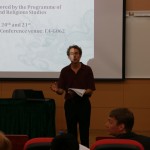
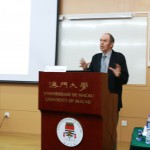
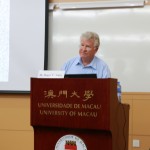
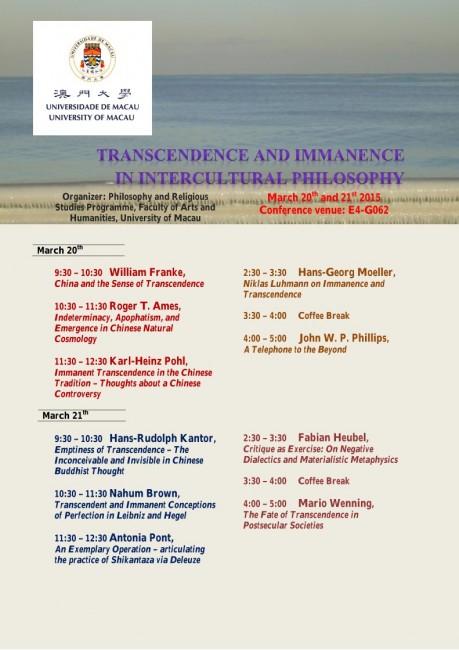
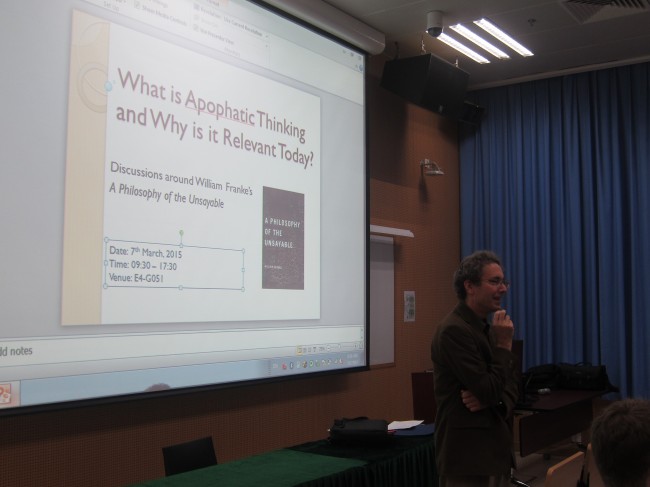
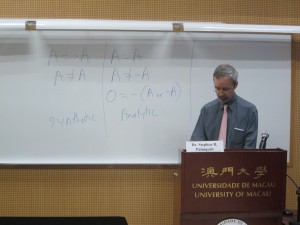
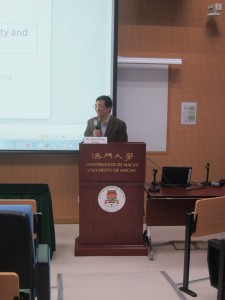
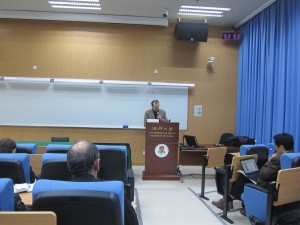
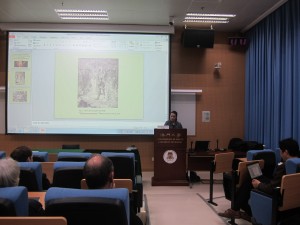
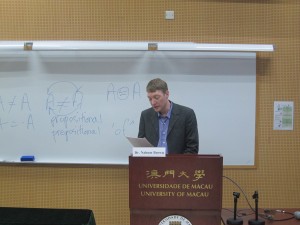
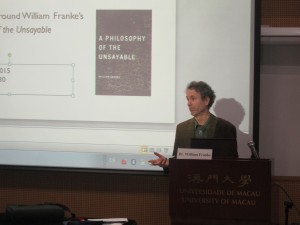
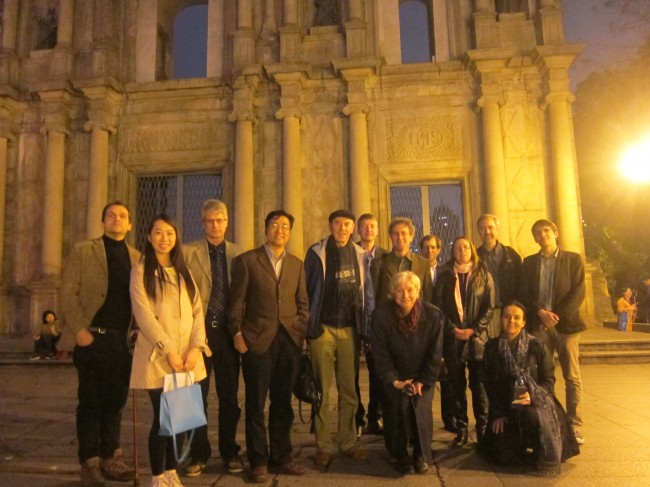



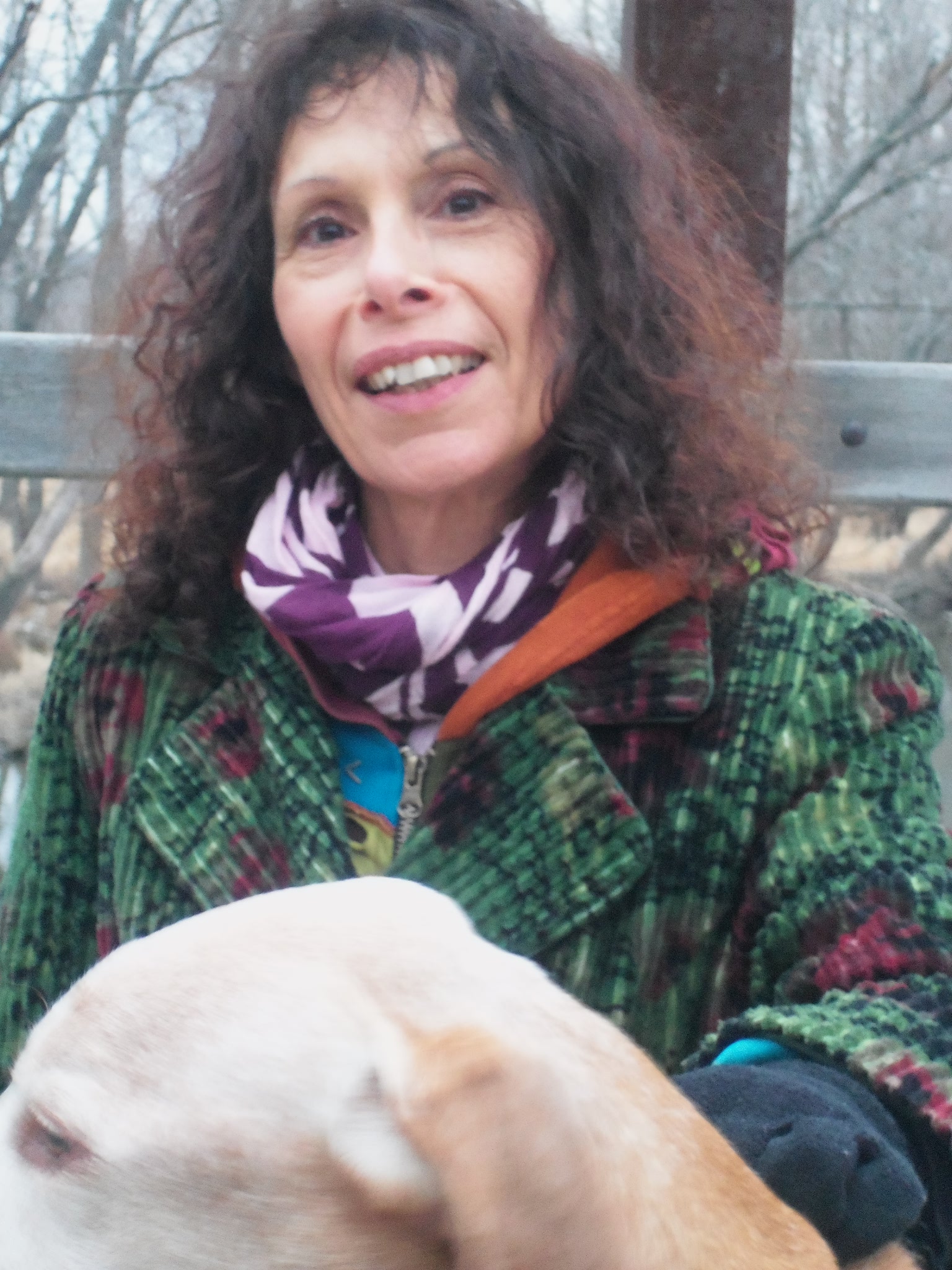
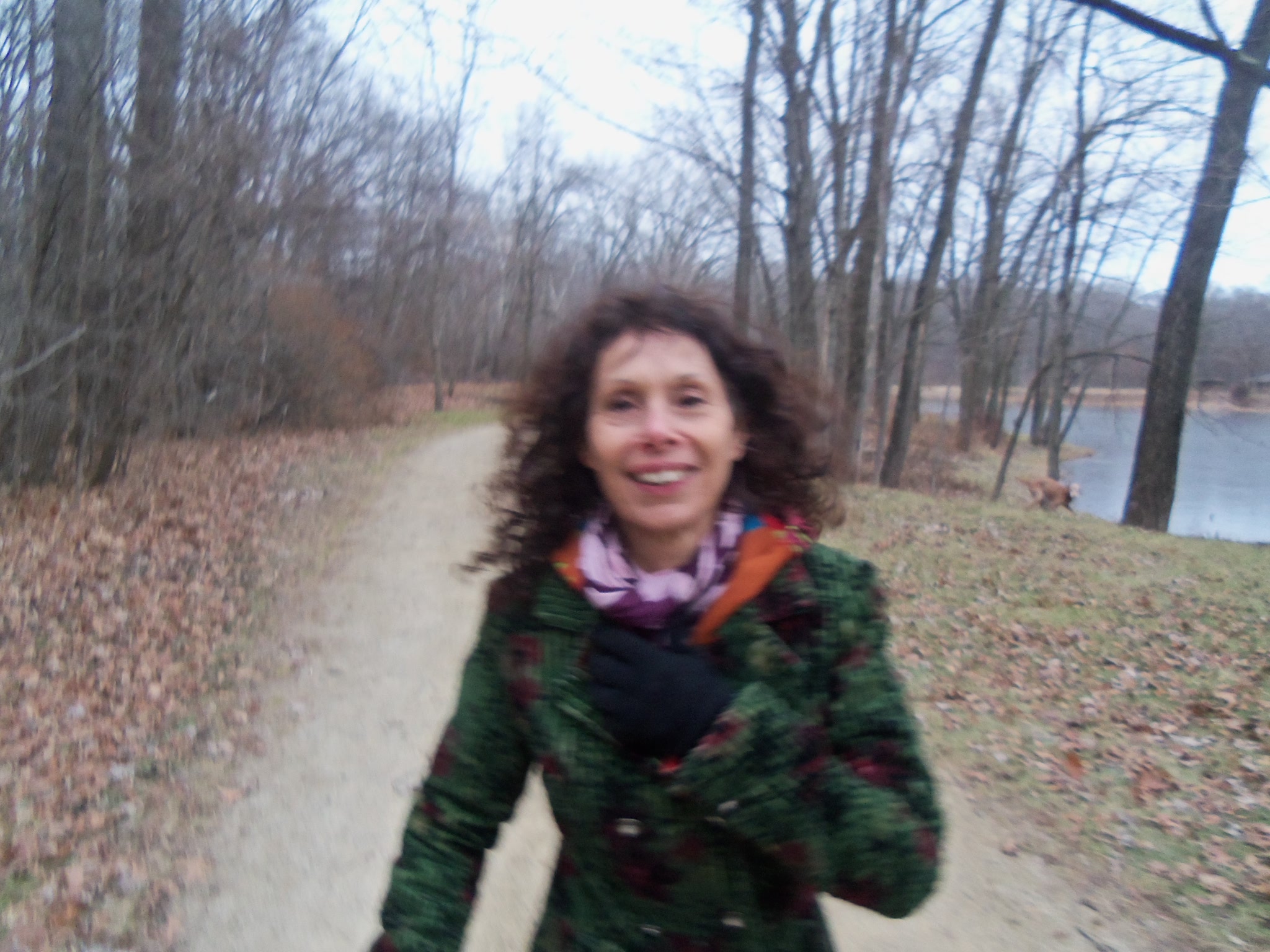
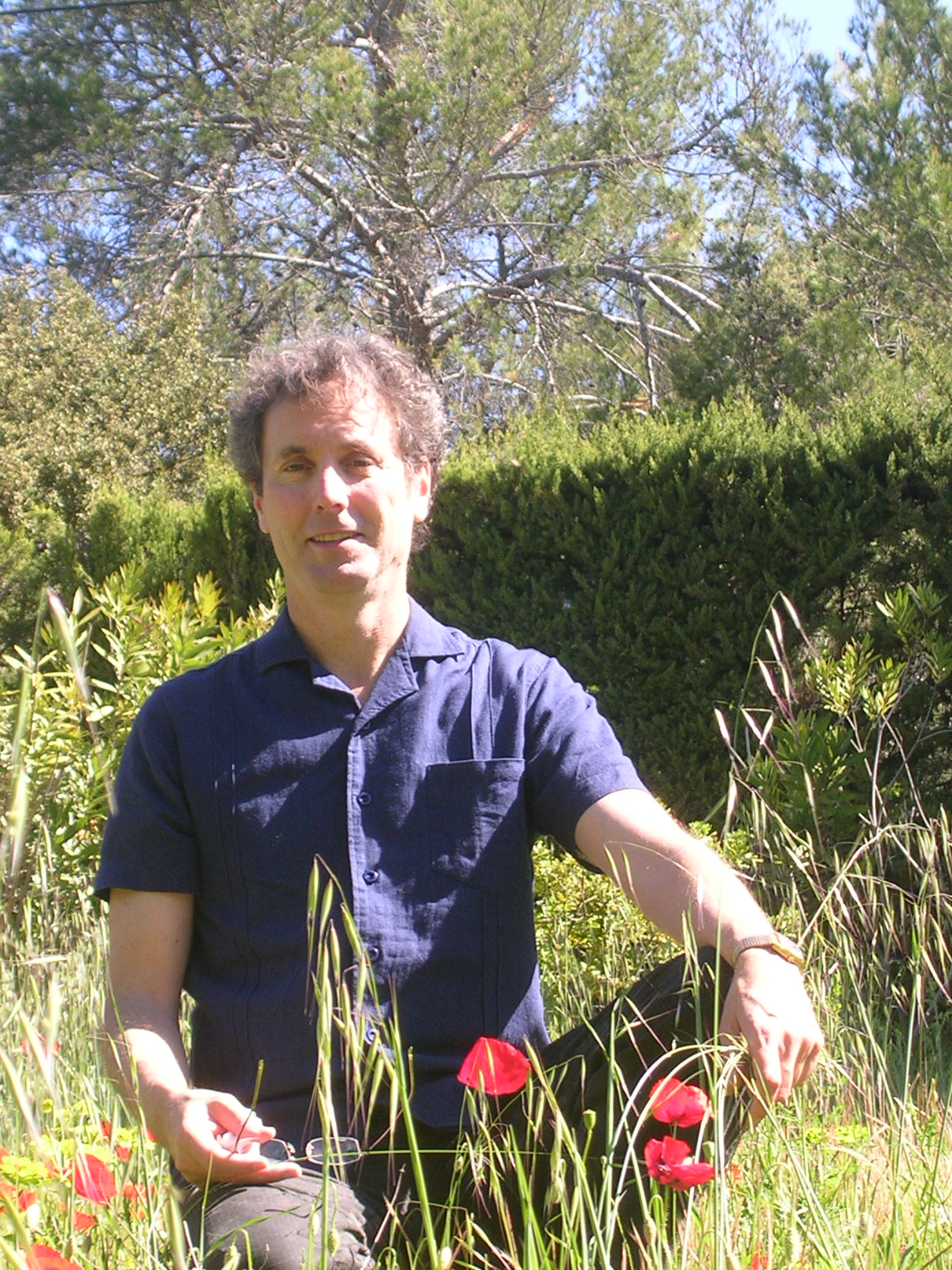
©2024 Vanderbilt University ·
Site Development: University Web Communications